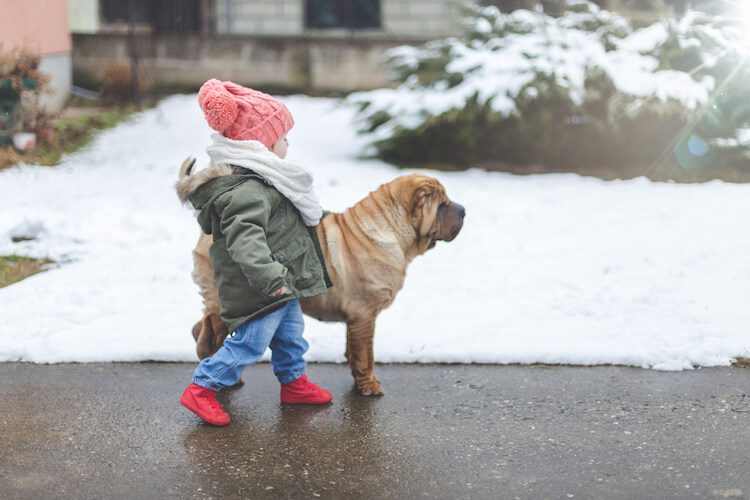In a place like Boulder County, it’s hard to imagine making it through a winter without deicer.In a place like Boulder County, it’s hard to imagine making it through a winter without deicer.
But it’s even harder to stomach the possibility of a sick pet — which is why it’s important to know your deicers and which ones could be harmful to your dog or cat.
Ice on your sidewalks, driveway, and steps makes for a mess that can pose a danger to you and your family. The best way to prevent ice buildup is to nip it in the bud by keeping your surfaces clear after each snowfall so the snow can’t melt and then turn into ice when temperatures fluctuate.
But if you miss the chance to clear that snow, then you may look for a deicing solution to keep your sidewalks and driveway safe. Deicers are a great way to knock out the slippery stuff so you can get to where you need to go without the risk of slipping and falling.
But certain kinds of deicers can be corrosive to your surfaces and harmful to your lawn. And some contain chemicals that could be dangerous to your dog or cat (or other neighborhood pets) if they eat it.
If your dog or cat walks on a salt deicer some will probably get stuck in their paws, which they will likely lick off. That’s why it’s important to make your winter home as safe as possible for your pet by choosing a safe deicer.
How Dangerous Are Deicers for Pets?
Most deicers contain salt compounds that could potentially be lethal to animals if they consume too much. But considering your animal would need to consume a large amount to be in serious danger, general discomfort is a lot more likely.
The salts will upset your pet’s stomach and digestive tract, and could make them sick.
Additionally, deicers containing calcium salts don’t have to be consumed to be a nuisance for your pet — contact with their paws and skin can cause irritation.
So are there deicers that are totally safe for pets? And do they work as well for getting rid of ice?
The short answer is yes: There are several options for effectively fighting ice around the home without putting your pets in harm’s way. You just need to know what to look for — and what to avoid.
Which Deicers Are Safe for Pets?
The good news is that there are several quality pet-safe deicing products on the market.
What to look for in a pet-safe deicer:
- A label claiming a product is “pet-safe” isn’t enough: There aren’t many regulations for these claims.
- Check for warnings like “keep away from children”: If it’s not safe for children, it probably isn’t safe for your pet.
- Look at the list of ingredients in the deicer and avoid products that contain chlorides or salts: Morton, for example, makes a chloride and salt-free “Safe-T-Pet” deicer that was developed with veterinarians to be safe for pets.
Natural Deicing Alternatives — Safe for Pets and Your Lawn
If you want to be extra careful with your deicers, you can take the all-natural route.
Imagine you’re walking home down a salt covered sidewalk before crossing your lawn to the front door — you just tracked deicer across your grass. That salt can dehydrate your lawn’s root system.
And when deicer runs off your driveway with the snowmelt, the chemicals within can end up in your lawn, too.
A chemical-based deicer can kill your plants or lawn, and damage the health of your soil. Natural deicers are safe for not only your pet, but also for your grass, trees, and other plants.
You can look for a non-toxic deicer such as Natural Alternative Ice Melt or Safe Paw, or you could even make your own deicer at home:
DIY deicer recipe:
- 1/2 gallon of warm water
- 1 tablespoon of rubbing alcohol (while we wouldn’t recommend pouring rubbing alcohol directly on your plants, the concentration here is low enough that any run-off should be safe for your lawn)
- 1 teaspoon of Dawn or other animal-friendly dish soap
- Mix and pour over icy sidewalks, steps, and driveways
It may take a few applications to melt down ice, but it should help!
Best Practices No Matter What Deicer You Use
If you aren’t getting the results you want from pet- and lawn-safe options and have a chemical deicer that gets the job done, then follow these safety tips to keep your pets and lawn as safe as possible:
- Keep your pets inside while the deicer is applied.
- Clear your surfaces of any remaining deicer after ice is gone.
- Avoid tracking the deicer onto your lawn.
The best defense against ice is a good offense. By clearing away snow from your sidewalk, driveway and porch before it has a chance to melt and freeze into ice, you won’t need to use deicers as often.
Quick snow removal isn’t always easy — you’ve got a job to go to, kids to raise, and pets to play with. Live your life and let the pros at GSC take care of the snow and ice. Learn more about our snow removal services »


